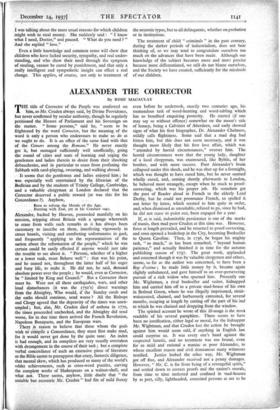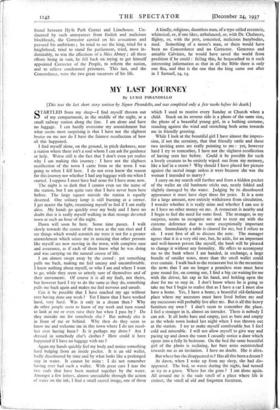ALEXANDER THE CORRECTOR
By ROSE MACAULAY
THE title of Corrector of the People was conferred on him, so Mr. Cruden always said, by Divine Providence, but never confirmed by secular authority, though he regularly petitioned the Houses of Parliament and his Sovereign on the matter. " Some- persons," said he, " seem to be frightened by the word Corrector, but the meaning of the word is only a person who endeavours to make us do as we ought to do. It is an office of the same kind with that of the Censors among the Romans." He never exactly got it, but managed sufficiently well unofficially, going the round of cities and seats of learning and urging the gentlemen and ladies therein to desist from their shocking debaucheries, and in particular to cease from profaning the Sabbath with card-playing, swearing, and walking abroad.
It seems that the gentlemen and ladies enjoyed him ; he was especially well entertained by the librarian of the Bodleian and by the students of Trinity College, Cambridge, and a valuable clergyman at London declared that the Corrector deserved a public reward (or was this for his Concordance ?). Anyhow,
Born to reform the Morals of the Age, Burning with Zeal, yet in his Conduct sage,
Alexander, backed by Heaven, proceeded manfully on his mission, tripping about Britain with a sponge wherewith to erase from walls such remarks as it has always been customary to inscribe on them, interfering vigorously in street brawls, visiting and comforting unfortunates in gaol, and frequently " applying to the representatives of the nation about the reformation of the people," which he was certain could be easily effected if anyone would just take the trouble to see about it. " Persons, whether of a higher or a lower rank, must Behave well " : that was his point, and he ceased not, throughout the latter half of his eager and busy life, to make it. He did not, he said, demand absolute power over the people ; he would, even as Corrector, be " limited by King and Council." But a Corrector there must be. Were not all these earthquakes, wars, and other loud disturbances (it was the 1750's) direct warnings from the Almighty, Who would, if the Sunday cards and the oaths should continue, send worse ? All the Bishops and Clergy agreed that the depravity of the times was unex- ampled ; but, alas, Mr. Cruden died of asthma in 177o, the times proceeded unchecked, and the Almighty did send worse, for in due time there arrived the French Revolution, Napoleon Bonaparte, and the European wars.
There is reason to believe that those whom the gods wish to compile a Concordance, they must first make mad, for it would never get done by the quite sane. An index is bad enough, and its compilers are very usually overtaken with derangement in the course of their task ; but a complete verbal concordance of such an extensive piece of literature as the Bible seems to presuppose that crazy, fantastic diligence, that mental skew, which has produced so many of the world's odder achievements, such as cross-word puzzles, carving the complete works of Shakespeare on a walnut-shell, and what not. There seems, anyhow, little doubt that " the amiable but eccentric Mr. Cruden " had fits of mild frenzy even before he undertook, exactly two centuries ago, his tremendous task of word-hunting and word-tabling which has so benefited enquiring posterity. He started (if one may say so without offence) somewhat on the moon's side of lunacy, being a Calvinist of Aberdeen, and early showed signs of what his first biographer, Dr. Alexander Chalmers, mildly calls flightiness. Some said that a mad dog had bitten him, but this does not seem necessary, and it was thought more likely that his first love affair, which was " attended by horrid circumstances," overset him. The horrid circumstances were that the young lady, daughter of a local clergyman, was enamoured, like Byblis, of her brother, and with more success. Poor Alexander's brain collapsed under this shock, and he was shut up for a fortnight, which was thought to have cured him, but he never seemed wholly cured, and, coming shortly afterwards to London, he behaved most strangely, except when he stuck to proof- correcting, which was his proper job. He somehow got the post of Reader aloud in French to the elderly Lord Derby, but he could not pronounce French, so spelled it out letter by letter, which seemed to him quite in order, and, when dismissed as unsuitable, refused to go, since he had, he did not cease to point out, been engaged for a year.
If, as is said, indomitable persistence is one of the marks of mania, then mad poor Cruden at this time was. However, force at length prevailed, and he returned to proof-correcting, and soon opened a bookshop in the City, becoming Bookseller to Queen Caroline. Then, in 1736, he began his mighty task, " so much," as has been remarked, " beyond human patience," and actually finished it in time for the autumn publishing season of 1737. The great work, applauded and esteemed though it was by valuable clergymen and others, seems, so far as the author was concerned, to have been a flop d'estime ; he made little money by it, became again slightly unbalanced, and gave himself to an over-persevering pursuit of a rich widow who spurned him. Presently one Mr. Wightman, a rival bookseller and suitor, kidnapped him and carried him off to a private mad-house of his own in Bethnal Green, where he was illegally imprisoned, strait- waistcoated, chained, and barbarously entreated, for several months, escaping at length by cutting off the part of his bed to which he was chained and dropping from the window.
The spirited account he wrote of this ill-usage is the most readable of his several pamphlets. There seems to have been no justification, either legal or moral, for the kidnapper Mr. Wightman, and that Cruden lost the action he brought against him would seem odd, if anything in English law could surprise us. It was every one's hand against the suspected lunatic, and no treatment was too brutal, even for so mild and rational a maniac as poor Alexander, to whose excellent reason and civil demeanour many witnesses testified. Justice looked the other way, Mr. Wightman got off free, and Alexander received not a penny damages. However, " Mr. C. is far from being of a revengeful spirit," and settled down to correct proofs and the nation's morals, from time to time molested and confined in mad-houses by as pert, silly, lightheaded, conceited persons as are to be found between Hyde Park Corner and Limehouse. Un- daunted by such annoyances from foolish and malicious blockheads, the Corrector carried on his avocations and pursued his ambitions ; he tried to see the king, tried for a knighthood, tried to stand for parliament, tried, most in- domitably, to win the affections of a Miss Abney ; all these efforts being in vain, he fell back on trying to get himself appointed Corrector of the People, to reform the nation, and to relieve condemned prisoners. This last, and the Concordance, were the two great successes of his life. A kindly, religious, dauntless man, of a type called eccentric, whimsical, or, if one likes, unbalanced, or, with Dr. Chalmers, flighty, or, with the pert, conceited, malicious busybodies, mad. Something of a moon's man, or there would have been no Concordance and no Corrector. Generous and amiable Calvinist, he would have saved the world from perdition if he could : failing this, he bequeathed to it such interesting information as that in all the Bible there is only one flea, and -that is the one that the king came out after in I Samuel, 2.4, 14.



































 Previous page
Previous page